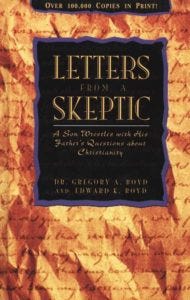Letters From a Skeptic: A Son Wrestles with His Father's Questions about Christianity by Greg Boyd

In 1989 Greg Boyd was teaching Christian apologetics at Bethel University. He hadn’t discussed his Christian faith with his father much, if at all, since he’d last tried years before when he was in his late teens and recently converted. So he decided to try a new approach for engaging his 70-year-old skeptic dad in matters of faith: correspond by personal letters, allowing him to pose to Greg any and all objections he might have to Christianity, the existence of God, etc. Over the next three years Greg’s dad slowly, painfully, but inexorably was dragged kicking and screaming into a belief and trust in Christ.
This book is by far the best “apologetic” I’ve ever read–precisely because it’s not one in the classic sense. It’s personal, pastoral, and passionately exhortative. Greg simply lets his dad’s questions and hang-ups drive the conversation. The result is a transformation.
As pastor Douglas Wilson observed recently in a blog post:
If the point is to win men, and not arguments, then we have to understand where the actual hang-up is with that unbeliever. The fact that we understand the foundational issues does not mean that he does, and what good does it do to bounce arguments off his forehead, which then just lie on the floor unheard?
At the same time, when someone observes that rigorous analytic philosophy leaves a pomo-hipster with marriage problems unmoved, the temptation is then to think that there is something wrong with the rigorous reasoning. No, there is nothing wrong with it, but the hard cold concrete of my presuppositions might need to stay in the basement, holding the house up, while my wife prepares chicken enchiladas for the family and we invite the troubled couple over. The foundation holds the kitchen up, and I can cheerfully grant that the unbeliever was greatly moved by the fellowship around the table without concluding that we shouldn’t have spent all that money on the foundation walls. We can always explain the connection to him later. Boyd does exactly this. He patiently answers all his father’s questions, never forgetting that he’s aiming to win the man and not the argument. That’s a very important lesson to learn and remember. I would recommend this book to any skeptic looking for a personal and academic explanation of why Christianity is true, and to existing believers looking for an example of loving evangelism in the context of relationship.
I differ with Boyd on many important theological issues, but this book is fantastic.
